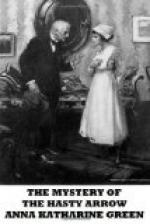“Whew! And who....”
“If this fact had been made known to me sooner, you would have had a different day’s work; not getting it until late this afternoon, we have perhaps wasted some valuable hours. But we won’t fret about that. Mrs. Taylor being no better, we are likely to have all the time we want for substantiating my idea. It cannot take long if we succeed either in tracing the Duclos woman or in drawing the net I am quietly manufacturing, so closely about—well, I’ve decided to call him X—that it will hold against all opposition. I have hopes of finding the woman, but great doubts as to the efficacy of the net I have mentioned; it will have to be so wide and deep, and so absolutely without a single weak strand.”
Sweetwater sat astonished, and what was more, silent—he who had a word for everything. Accustomed as he was to the varying moods of his remarkable friend, he had never before been met with a reticence so absolute. It made him think; but for once in his life did not make him loquacious.
Mr. Gryce seemed to be gratified by this, though he made no remark to that effect and continued to preserve his abstracted look and quiet demeanor. So Sweetwater waited, and while waiting managed to steal a glimpse at the small object to which his professional friend still paid his undivided attention.
It looked like a narrow bit of dingy black cloth—just that and nothing more—a thing as trivial as the band which clips a closed umbrella. Was it such a band, and would he presently be asked to find the umbrella from which it had fallen or been twisted away? No. Umbrellas are not carried about museum buildings. Besides, this strip of cloth had no ring on the end of it. Consequently it could not have served the purpose he had just ascribed to it. It must have had some other use.
But when, after an impatient flinging aside of this nondescript article, Mr. Gryce spoke, it was to say:
“I had a long talk with Correy to-day. It seems that he goes through both galleries every morning before the museum opens. Though he will not swear to it, he is of the opinion that the quiver holding the Apache arrows had its full complement when he passed it that morning. He has a way of running things over with his eye which has never yet failed to draw his attention to anything defective or in the least out of order.”
“I see, sir,” acquiesced Sweetwater in an odd tone, Mr. Gryce’s attitude showing that he awaited some expression of interest on his part.
The elder detective either did not notice the curious note in the younger one’s voice, or noticing it, chose to ignore it, for with no change of manner he proceeded to say:
“I wish you would exercise your wits, Sweetwater, on the following troublesome question: if the arrow which slew this young girl was in one gallery at ten o’clock, how did it get into the other at twelve? The bow”—here he purposely hesitated—“might have been brought up the iron staircase. But the arrow——”




